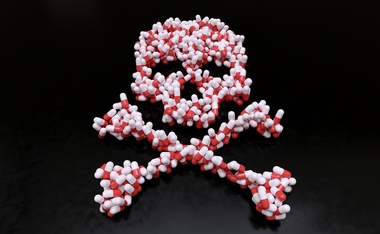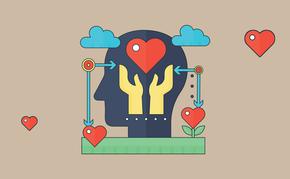The views expressed in our content reflect individual perspectives and do not represent the authoritative views of the Baha'i Faith.
For much of my adult life, I’ve worked professionally to reduce drug and alcohol abuse and addiction – but today, I feel like my country is losing that battle over the murderous synthetic opioid fentanyl.
Recently where I live, a local family tragically lost a child to a fentanyl overdose, and the family’s boundless grief and pain has spread out in concentric circles among relatives, friends, neighbors, and the entire community.
As a parent, I cannot imagine anything worse than losing one of your children to a needless and pointless death.
RELATED: Opioids and the Loss of a Child: Heartened through Heartbreak
Let me tell you the story. (I’ve changed some of the details to protect identities.) This bright young woman, a vivacious, talented, and promising university student, needed to study for an important upcoming test. Exhausted and stressed, she ordered what she thought was Adderall, a medication her doctor had prescribed in the past, from a Snapchat seller that might have seemed legitimate, but wasn’t. The pills arrived, in the exact same configuration she had taken before – same color, shape, markings, and branding. She got her books out, settled in to study at her desk, and took one.
It turned out to be fentanyl, and it killed her – fast.
Fentanyl, a synthetic opioid and a Schedule II controlled substance, is approximately 100 times more potent than morphine. Apparently drug cartels now have sophisticated pill manufacturing capabilities, and can make and sell counterfeit pills containing fentanyl that fool even the experts.
This means any pill bought on the street or ordered through sketchy social media contacts can have fentanyl in it. The US Drug Enforcement Agency (DEA) reports that 42% of the millions of counterfeit pills they’ve recently seized and tested contained at least 2 milligrams of fentanyl – a potentially lethal dose.
Opioids and their synthetic derivatives can work wonders for patients in great pain, when properly prescribed and managed by conscientious physicians and nurses. But in the wrong hands, and for the wrong reasons, opioids and their synthetic analogues can do terrible harm, not only to individuals but to society itself. Because of that potential for great harm, the Baha’i teachings warn humanity about the illicit use of opioids in the strongest possible terms. Abdu’l-Baha wrote:
As to opium, it is foul and accursed. God protect us from the punishment He inflicteth on the user. According to the explicit Text of [Baha’u’llah’s] Most Holy Book, it is forbidden, and its use is utterly condemned. Reason showeth that smoking opium is a kind of insanity, and experience attesteth that the user is completely cut off from the human kingdom. May God protect all against the perpetration of an act so hideous as this, an act which layeth in ruins the very foundation of what it is to be human, and which causeth the user to be dispossessed for ever and ever. For opium fasteneth on the soul, so that the user’s conscience dieth, his mind is blotted away, his perceptions are eroded. It turneth the living into the dead.
It certainly does turn the living into the dead – literally. Cheap, potent in tiny amounts, easy to smuggle and simple to disguise, the synthetic opioid fentanyl is chiefly responsible for most of the record number of overdose deaths in the United States – which killed 107,622 people in 2021.
Overdoses – The Death Toll Gets Higher
The statistics are frightening. According to federal data, overdoses have now become the leading cause of preventable death among people ages 18 to 45, more than suicide, highway fatalities, and gun violence. In the United States, overdoses from fentanyl rose 55 per cent between 2020 and 2021. For comparison purposes, the United States had 25,000 murders in 2021 and approximately 40,000 deaths in car accidents – even when combined, nowhere near the terrible loss exacted by synthetic opioids.
Can you imagine a war that killed 100,000 Americans each year? For context and comparison, the combined death toll of U.S. soldiers killed in Vietnam, Iraq, and Afghanistan – by far America’s longest wars, lasting for more than 30 years in all – totals about 65,000 people.
World War I killed 116,000 Americans. World War II, where U.S. involvement lasted for four years, killed 405,000 Americans. If our country, God forbid, continues to set new records each year for opioid overdose deaths, we will eclipse the terrible toll of both World Wars by 2027.
In this war, drugs are winning. So yes, we’re in brutal combat – against opioids. The loss of one sweet daughter now represents just one more tragic, needless death among tens of thousands. She is gone, and her absence will forever blight the lives of her family, her friends, and society at large. So what’s the solution? How can we fix or even begin to reduce this fatal epidemic of overdoses?
RELATED: How the Brain Deals with Pain and Addiction
Curtailing the Supply
Many attempts at curtailing the supply of illicit drugs have been tried, most of them unsuccessfully. More enforcement, stiffened legal penalties and longer prison terms – the so-called “war on drugs” – did not reduce the problem. Increased interdiction efforts at American borders haven’t stopped it, either – in fact, the deaths have continued to rise faster than ever. Experts now generally agree that these “supply-side” interventions work less effectively than the various efforts at the other end of the issue – reducing demand.
Curtailing the Demand
Research has shown that educational efforts can help reduce demand, especially when they’re realistically and consistently implemented with younger children. Substance abuse treatment programs have also proven to reduce demand, but getting treatment for a drug or alcohol problem isn’t easy, affordable, or readily available to many – and treatment wouldn’t have helped that daughter, who was not a regular drug user and certainly not an addict.
The Long-Term Spiritual Solution
The only true long-term solution to this heartbreaking issue, I’ve become convinced after four decades of working with people who need help, is a spiritual one. We must fill the deep need in people’s souls for healing and spiritual sustenance that they cannot access in our current culture, and we must find more effective ways to prevent people from making their first foray into drug use.
Baha’is believe that both of those things can happen when people learn about the Baha’i message, and come to understand the teachings of that center of illumination, the new divine messenger, Baha’u’llah:
Likewise in the spiritual realm of intelligence and idealism there must be a center of illumination, and that center is the everlasting, ever-shining Sun, the Word of God. Its lights are the lights of reality which have shone upon humanity, illumining the realm of thought and morals, conferring the bounties of the divine world upon man. These lights are the cause of the education of souls and the source of the enlightenment of hearts, sending forth in effulgent radiance the message of the glad-tidings of the kingdom of God.
Those who follow Baha’u’llah’s teachings make a deep personal and spiritual commitment to protect themselves from the debilitating effects of mind-altering substances unless they are legitimately prescribed by a medical professional. They also partake of the soul-enlightening educational and spiritual influence of that “ever-shining Sun, the Word of God,” revealed anew in this modern age in the Baha’i writings. Baha’u’llah wrote:
Cast away, then, from you that which your minds abhor, for it hath been forbidden unto you in His Tablets and His Scriptures. Beware lest ye barter away the River that is life indeed for that which the souls of the pure-hearted detest. Become ye intoxicated with the wine of the love of God, and not with that which deadeneth your minds, O ye that adore Him!
Typically, and unfortunately, substance use and abuse begins early in a person’s journey toward maturation. Many of those substances – “that which deadeneth your minds,” as Baha’u’llah described them – have their most outsized impact and highly addictive effect on the human brain before wisdom and judgment can fully develop. When a child, an adolescent, or a young person uses the chemically powerful substances available today, especially if they are laced with Fentanyl, addiction can quickly follow, and death often results. That means each family and every society must prioritize early education and intervention.
The global Baha’i community has developed an alternative path for young people – emphasizing service to humanity – by organizing groups of youth and “junior youth,” the 11-14 year old age cohort most susceptible to early drug and alcohol experimentation. Baha’i communities everywhere sponsor and support these groups, which emphasize unity, peace, and love for others. These free, open-to-all programs tie spiritual education directly to active community-building, and kids who take part learn how to see different perspectives, understand and bond with one another, and choose wiser paths to adulthood and full maturity. You can find out more about these programs by getting in touch with your local Baha’i community.
Authentic Adderall
Prescription stimulants used to treat Attention-Deficit / Hyperactivity Disorder (ADHD). Used as a study aid, to stay awake, and to suppress appetites. Prescribed as Adderall®, Concerta®, Dexedrine®, Focalin®, Metadate®, Methylin®, Ritalin®.
Authentic Adderall® Front
Authentic Adderall® Back
Authentic Adderall®
Side by Side
Counterfeit
Street Names: A-Train; Abby; Addy; Amps; Christmas Trees; Co-Pilots; Lid Poppers; Smart Pills; Smarties; Study Buddies; Study Skittles; Truck Drivers; Zing
Counterfeit Adderall® Front
Counterfeit Adderall® Back
Counterfeit Adderall®
Side by Side
















Comments
Sign in or create an account
Continue with Googleor